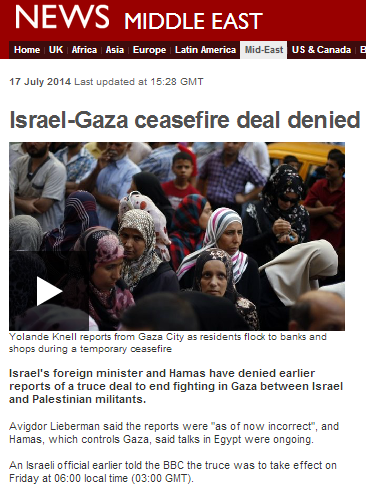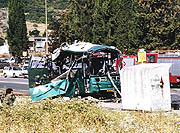An article from July 17th which now appears on the BBC News website’s Middle East under the title “Israel-Gaza ceasefire deal denied” includes the following statements:
“A five-hour humanitarian ceasefire took place on Thursday but hostilities quickly resumed after it ended. […]
The humanitarian truce took place between 10:00 and 15:00 local time on Thursday.
It was requested by the UN and other international organisations to provide emergency relief and distribute water, food and hygiene kits.
Gazans used the truce to stock up on supplies. They queued outside banks and there were traffic jams.
Both sides reported violations of the temporary truce.”
Whether the BBC has independently verified the claim of IDF fire made on a television station run by Hamas before amplifying it is not made clear to audiences. However, what is interesting is that the final version of this report makes no proper mention of what is known: that some two hours into the agreed temporary ceasefire, three mortars were fired at the Eshkol region.
That the BBC is aware of that incident is shown by the fact that earlier versions of this same article were titled “Gaza mortars ‘disrupt ceasefire’ – Israel Defense Forces” and “Gaza mortars ‘hit Israel during ceasefire’ – IDF”. By the article’s seventh version, information relating to that mortar fire had disappeared from the report.
Also on July 17th a major incident took place when a group of thirteen terrorists infiltrated Israel via a cross-border tunnel located near Kibbutz Sufa.
“The Israeli army thwarted a large-scale infiltration attempt along the Gaza border, during which 13 armed Palestinians emerged from a tunnel on the Israeli side of the border at dawn Thursday, an army spokesperson said. […]
The gunmen, he said, emerged from the tunnel early Thursday some 250 meters inside Israel. Lying flat on the ground, in an open area two kilometers from Kibbutz Sufa in the Eshkol region, the 13 armed men were spotted by what Lerner termed “different sensors.”
Realizing that they had been discovered, they attempted to run back underground but were struck by Israeli aircraft. Lerner said some had been hit but he could not state how many.
Israeli military sources said the gunmen evidently planned to attack the kibbutz, killing and possibly kidnapping civilians.”
That serious incident received no separate coverage on the BBC News website. Readers of the above article had to proceed to its twenty-ninth paragraph before they were very briefly informed that:
“The Israeli military also said it had thwarted the infiltration into Israel by 13 Hamas gunmen via a tunnel from southern Gaza towards the southern Israeli kibbutz of Sufa on Thursday morning.”
In another article from the same day titled “Gaza ceasefire between Hamas and Israel begins” that same one sentence appeared in the fourteenth paragraph, together with some additional information.
“The Israeli military also said it had thwarted the infiltration into Israel by 13 Hamas gunmen via a tunnel from southern Gaza towards the southern Israeli kibbutz of Sufa on Thursday morning.
Army spokesman Lt Col Peter Lerner said the gunmen were 250 metres (820ft) inside Israel when they were intercepted by Israeli aircraft. He said at least one militant was believed killed and that the others escaped back into Gaza.”
A report titled “Israel starts Gaza ground offensive” which is now dated July 18th but was actually first published on July 17th informs readers in its nineteenth paragraph that:
“Israel said the initial phase [of the ground operation] was aimed at targeting tunnels Hamas has dug under the border with Israel to use in attacks.
On Wednesday [sic] 13 militants infiltrated into Israel through a tunnel aiming to attack a kibbutz, Israeli officials said. The Israeli military said it killed at least one of the militants, while the others retreated through the tunnel.”
No attempt was made in any of these reports to put the subject of building materials used by Hamas to construct cross-border tunnels for terror purposes into its appropriate context with relation to the restrictions on imports of certain building materials – a frequent topic of BBC reports.
Another major event which took place on July 17th was the announcement by UNRWA that twenty missiles had been found in one of its schools in the Gaza Strip. No separate report on that subject appeared on the BBC News website.
In the first article that was laconically reported in the eighth paragraph.
“On Thursday, the UN Relief and Works Agency for Palestine refugees said it had found 20 rockets hidden in one of its vacant schools in Gaza and “strongly condemned” whichever group had placed them there.”
The information did not appear in either of the other two reports published on the BBC News website on July 17th, although ironically the second article does state:
“Israel accuses Hamas of hiding its military infrastructure within the civilian population.”
With the BBC having severely downplayed – and even denied – the use of the local civilian population as human shields by Hamas and other terrorist groups in the Gaza Strip, the lack of any attempt to put the discovery of missiles in a UN-run school into its proper context is especially remarkable.
Related Articles:
BBC uses unverified quote to advance its narrative
BBC promotes UNRWA lie
Another dumbed-down BBC report from the Gaza Strip




